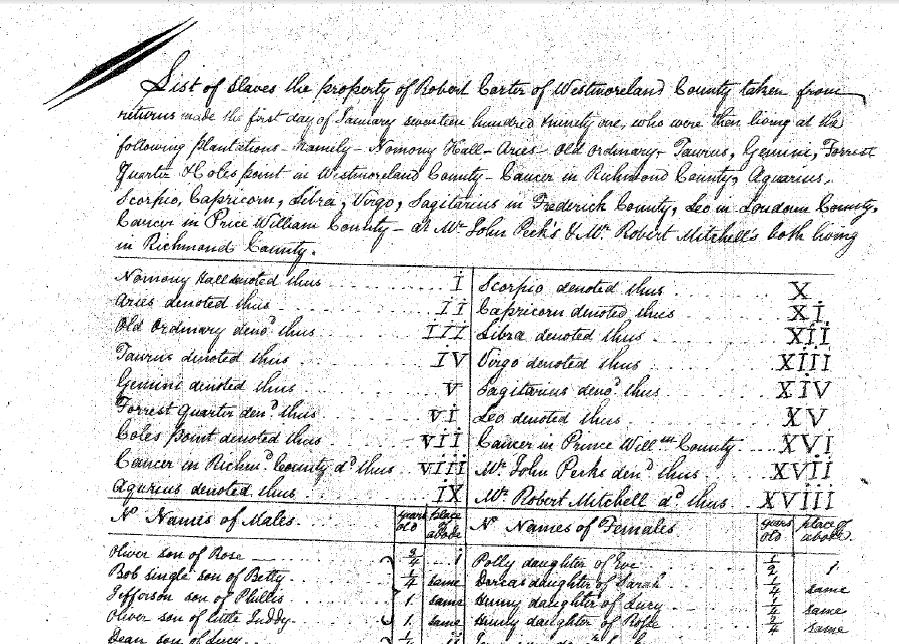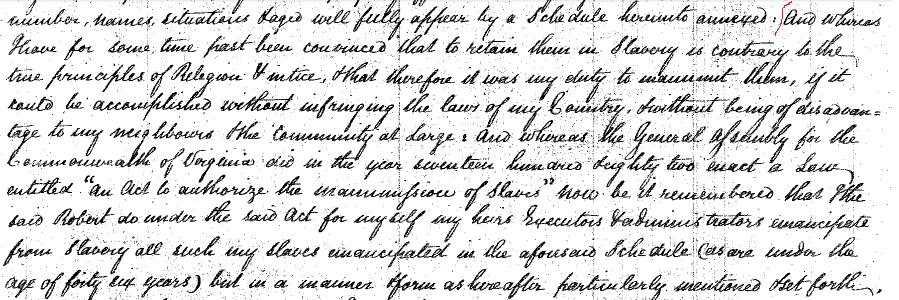On Friday, we posted part one of our response to David Barton’s appearance on the Glenn Beck Show (8/16/12). On that show, Barton defended his claim that Virginia law did not allow Thomas Jefferson to emancipate his slaves. In The Jefferson Lies, Barton does not cite the part of the 1782 Virginia law that allowed slave owners to emancipate their slaves. In his book, Barton does not mention that owners were allowed to free their slaves during the life of the owner and gives no explanation for why he omitted that portion. During his appearance on the Glenn Beck Show, he mentioned the section of the law that allowed manumissions, but gave no explanation about why he failed to include it in his book.
On the Beck show, Barton said Virginia law required slave owners to provide a security bond for emancipated slaves. Since Jefferson was often in debt, he was unable to provide these funds for his slaves. Part of the problem in getting clarity has been Barton’s presentation of the evidence in The Jefferson Lies. He says on page 94 that “Jefferson was unable to free his slaves under the requirements of state law…” Actually, Jefferson was able to free his slaves after 1782 in accord with the provisions of the law on manumission. Barton is now arguing that Jefferson’s inability was financial and not legal.
On the Beck show, Beck made an analogy to small business owners in the present. He said that one is allowed to start a business but the government regulations make it so difficult that it is practically impossible. To accept that analogy as relevant, one must find evidence that Virginia government regulations prevented manumissions. To be sure, during the years between 1782-1806, there were government regulations (writing a deed, and a small clerk’s fee for filing the deed), but they were not so onerous that manumission was impossible, as is demonstrated by the many private manumissions and the large one of over 450 slaves initiated by Robert Carter. And most important for Barton’s financial argument, we can find no evidence, nor has Barton presented any, that security bonds were required for slaves who were in the proper age range and of sound mind and body. As we demonstrate below, the evidence Barton presents does not relate to Virginia.
The one citation in The Jefferson Lies on the subject of security bonds is on page 92, where Barton writes:
Subsequent laws imposed even harsher restrictions, mandating that a slave could not be freed unless the owner guaranteed a full security bond for the education, livelihood, and support of the freed slave.
The footnote at the end of that sentence is to an 1857 book by W.O. Blake titled, The History of Slavery and the Slave Trade, Ancient and Modern. Barton cites page 386 as his source for this information. Below is the entire page 386 from that book. Instead of a reference to Virginia law, this page completes a discussion of the fate of children born of black and white parents and begins one on emancipation in Massachusetts.
Laws were even found necessary in some of those colonies to limit what was esteemed a superfluity of parental tenderness. In the Anglo American colonies, colored children were hardly less numerous. But conventional decorum more potent than law forbade any recognition by the father. They followed the condition of the mother. They were born and they remained slaves. European blood was thus constantly transferred into servile veins and hence among the slaves sold and bought to day in our American markets may be found the descendants of men distinguished in colonial and national annals. –Hildreth’s History United States
In Massachusetts, a controversy arose as to the justice and legality of negro slavery which was conducted by able writers. It began about 1766 and was continued until 1773, when the subject was very warmly agitated. In 1767 and afterwards, attempts were made in the legislature to restrict the further importation of slaves. It was even questioned whether under the laws of Massachusetts any person could be held as a slave. This point was carried before the superior court in a suit by a negro to recover wages from his alleged master. The negroes collected money among themselves to carry on the suit and it terminated favorably. Other suits were instituted between that time and the revolution and the juries invariably gave their verdict in favor of freedom. The pleas on the part of the masters were that the negroes were purchased in open market and bills of sale were produced in evidence that the laws of the province recognized slavery as existing in it by declaring that no person should manumit his slave without giving bond for his maintenance &c. On the part of the blacks it was pleaded that the royal charter expressly declared all persons born or residing in the province to be as free as the king’s subjects in Great Britain that by the law of England no subject could be deprived of his liberty but by the judgment of his peers that the laws of the province respecting an evil and attempting to mitigate or regulate it did not authorize it and on some occasions the plea was that though the slavery of the parents were admitted yet no disability of that kind could descend to the children. The view taken by the Massachusetts juries was sanctioned about the same time in England by a solemn decision of the court of king’s bench in the celebrated case of James Somersett mentioned in a former chapter. Being brought before Lord Mansfield on a writ of habeas corpus his case was referred to the full court. After the argument Lord Mansfield said In five or six cases of this nature I have known it accommodated by agreement between the parties On its first coming before me I strongly recommended it here But if the parties will have it decided we must give our opinion Compassion will not on the one hand nor inconvenience on the other be to decide but the law The question now is whether any dominion authority or coercion can be exercised in this country on a slave according to the American laws The difficulty of adopting the relation without adopting it in all…
A review of the pages (click the link to go to the book) before and after page 386 finds no mention of requirements for security bonds in Virginia. If you read on to page 389 of that book, you will read:
The Virginia Assembly, on the motion of Jefferson, prohibited in 1778 the further introduction of slaves. In 1782, the old colonial statute was repealed which forbade emancipations except for meritorious services to be adjudged by the governor and council. This repeal remained in force for ten years during which period private emancipations were very numerous. But for the subsequent reenactment of the old restrictions the free colored population of Virginia might now have exceeded the slaves. Maryland followed the footsteps of Virginia both in prohibiting the further introduction of slaves and in removing the restraints on emancipation.
Note that private manumissions were numerous according to this source used by Barton. Actually, the significant restrictions were not added until 1806. There is nothing mentioned here about a security bond.
In part three, we will address the remaining claims about slavery.
Here again is the Glenn Beck segment on slavery:
For additional parts of this series see:
Jefferson and Slavery: A Response to David Barton on the Glenn Beck Show, Part One


